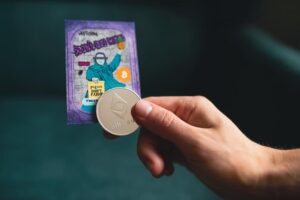
Some developers want to release games with NFT, and stores want to distribute those projects. That doesn’t stop players and gamemaking professionals from openly hating NFT and those who do it. A recent example is the story about the famous voice actor Troy Baker, who first announced his cooperation with Voiceverse, but then changed his mind. Public censure was the culprit.
NFT was called a new kind of fraud and a pyramid, and was criticized for environmental damage and hype. In fact, pyramid is a deception: people are asked for money, promised to invest it somewhere and get back a part of profit. What happens to that money? No one sees or knows. It’s a black box. After the pyramid organizers raise enough money, they pull the switch, close the offices, and leave a nominal executive who goes to jail.
NFTs and pyramid schemes have different audiences. The latter attract desperate people who take out a loan with their last bit of money to invest in a dubious scheme. NFTs are bought by investors with a surplus of cryptocurrency to spend somewhere. As a rule, they are technically savvy people.
Nevertheless, even if NFT is not a fraud per se, the technology is often exploited by unscrupulous people. The scale of the problem is horrifying: OpenSea, one of the largest NFT marketplaces, has claimed that 80% of NFTs created with free tools are fake. In such cases, the “token” is created by using someone else’s pictures, music and other digital works.
The aforementioned Voiceverse has also been accused of fraud. Voiceverse sells NFT in the form of audio files with actor lines. As promised by the creators of the startup, the buyer gets the copyright to the voice phrases and can use them in their games, cartoons and other projects. But Voiceverse believes it benefited from the work of others: one of the soundtracks was allegedly created by 15.ai, a service for “robotized” voiceover of typed text. Voiceverse claimed that it produced all the files itself, using neural networks.
Another type of fraud was described by one Reddit user. The creators of NFT buy their own product from a backup cryptocurrency wallet, and then rave on Twitter that someone bought their token so expensively. By doing so, the tricksters inflate the price of their token to sell it for more than it’s actually worth.
Of course, NFT is just technology. It can be used by both conscientious developers and scammers. Unfortunately, there are many of the latter: they see the popularity of NFT and the fact that the vast majority of people do not understand the technology. Hype and ignorance help to trick people who want to get rich on NFT, but don’t understand the subject very well.







